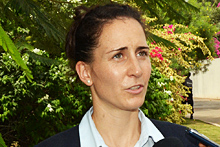Sport as a springboard
1-0 to development
The Olympic Games in Rio will captivate an audience of millions around the world. But what role can sport play beyond the highly paid stars, the titles, fame and glory?

An interview with former women’s footballer Heidi Beha, who is using sport to create opportunities for young people in Kenya.
Ms Beha, what is your experience of Sport for Development?
Faster, higher, further. Sport for Development is undergoing great dynamic growth – and it’s not just thanks to sport. In sub-Saharan Africa, where almost half the population is under the age of 15, demand is enormous: from equipment and infrastructure to provision of advanced training and adequate sports activities. On behalf of the German Federal Ministry for Economic Cooperation and Development (BMZ), we use Sport for Development primarily to address issues of education, gender equality, health and peace.
What is your role in Kenya?
Our focus is violence prevention through sport. For example, our activities are geared to integrating refugees. The camp in Kakuma is now a melting pot for nearly 200,000 people from South Sudan, Somalia and the Democratic Republic of Congo who don’t speak the same language and come from crisis areas. This coexistence within the refugee camp and alongside Kenyans from the surrounding area often leads to conflict. Firewood and drinking water are in short supply in north-western Kenya. So, too, is education. The administrative district surrounding the camp is one of the poorest in the country.
Are people there talking about the Olympic Games?
Yes, they are a big deal. And for the first time a team made up of refugees has qualified for the Olympics. Two women and three men from the Kakuma camp will be making history when they represent the refugee team in the 1,500 and 800 metres. Role models such as these athletes are hugely important and demonstrate that sport can be a springboard. Everyone in the refugee camp knows these stories – they draw hope from them for a brighter future. The Rio effect shines even in north-western Kenya.
Does Sport for Development offer a longer term outlook?
At schools in the refugee camp, classes have over 100 pupils. Many children and young people never even get a place at school. Extra-curricular education is therefore in great demand.
On behalf of BMZ, we use Sport for Development to fill this need – at the Kakuma refugee camp and in the surrounding area, as well as in other regions of Kenya. The current education reform places greater importance on talent promotion in culture and sport in the curriculum for schools, thereby strengthening our effectiveness and contributing to long-term development in the country.
What results have you achieved?
So far, 22,000 children and young people have benefited in our project countries. They run, dribble, kick and bounce balls on a regular basis, coached by instructors and teachers who integrate specific learning content into the exercises. Currently, 46 sports facilities are under construction or in planning in nine African countries, and a further 24 have already been completed. In addition, we provide advanced training for teachers and coaches of both genders who are already working with young people in sport, and we support partner organisations. This ensures that Sport for Development becomes integrated in the long term.
Are there differences with other countries?
Sport in Kenya is already one of the key instruments in youth and social work. More than 80 organisations work with Sport for Development – both in inner city slums and in rural areas. But in other countries, Sport for Development is still a very new concept. When I meet new partners, I often introduce myself by saying: unfortunately, there isn’t much we can do about helping your country to become champion of Africa or to win an Olympic gold medal; but we can definitely do something about giving as many children as possible access to sport and education and provide them with opportunities.
Where do you still see potential?
Sport is already of great commercial importance in many countries. There are opportunities here for international cooperation and also for fulfilling development objectives. In the activities implemented in connection with migration and refugee camps, sport has proved itself to be an effective and popular instrument. Good leadership at federation and club level, and sports policies based on transparency and the promotion of mass sport offer even more potential for development.
(as of August 2016)